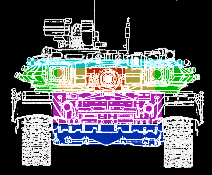
| ~80-90cm LOS cast mantle x 0.6-0.71 = 54-56cm KE & 80-90cm HEAT | |
|
81.5cm LOS x 0.72 [Cast/Ti-BDD] = 59cm x ~0.953 = 56cm plus K-5 = 74±2cm KE
81.5cm LOS x 0.88 [Cast/Ti-BDD] = 72cm plus K-5 = 118±4cm HEAT |
|
|
70-72cm LOS x 0.72 [Cast/Ti-BDD] = 50-52cm x 0.993 = 49-51cm plus K-5 = ~67-69±2cm KE4
70-72cm LOS x 0.88 [Cast/Ti-BDD] = 61-63cm plus K-5 = 104±5cm HEAT4 |
|
|
44-48cm LOS x 0.66 [Steel/STB] = 29-32cm KE plus K-5 where present = 48±6cm KE
44-48cm LOS x 0.77 [Steel/STB] = 34-37cm HEAT plus K-5 where present = 70±16cm HEAT |
|
|
[3 x 1.34 + 10.5 x 0.41 + 11] / 0.385 = ~51cm KE plus K-5 = 69±2cm KE
[3 x 1.3 + 10.5 x 0.55 + 11] / 0.385 = ~54cm HEAT plus K-5 = 94±4cm HEAT |
|
| 17-23cm KE and 17-23cm HEAT | |
| Side turret ranges from 40-60cm thick near front thinning to ~ 15-20cm around back. This is probably half and half cast/STEF thus the KE armor is 0.66 while the HEAT armor is 0.77. The effective KE armor ranges from 40cm narrowing quickly to 26cm and 10-13cm around back. The HEAT armor ranges from 46-31cm near the front down to 15-12cm Around back. In the side and rear turret are mounted external storage boxes ~50cm thick that will offer a modicum of spaced armor, this may amount to an additonal ~13-15cm HEAT armor. Additionally K-5 is mounted around the front side of the turret. | |
| The side hull is 6cm thick rolled steel but the lower side hull around the wheels is probably only 2cm thick; side skirts add 25 mm thick reinforced rubber [with steel?] plate plus 60cm airgap increasing the HEAT armor by about 15-17cm against 2nd gen and 26-28cm against 1st gen warheads. This rubber skirting is unlikely to add more than 1cm to the KE side armor, due to deflection. The fuel tanks along the sponsons should add 65cm x 0.1 KE and 0.3 HEAT or an additional 6-7cm KE and ~ 20cm HEAT armor. Over the front half of the side hull Kontakt-5 is mounted which probably adds ~30cm HEAT and at least 5 cm KE resistance. | |
| The rear armor is unlikely to be more than 4cm but fuel tanks mounted there could offer 0.1 to 0.15 Te resistance to APFSDS and 0.34 resistance to HEAT. The HEAT armor would range from 3-4cm to as much as 18cm additional HEAT armor. |
